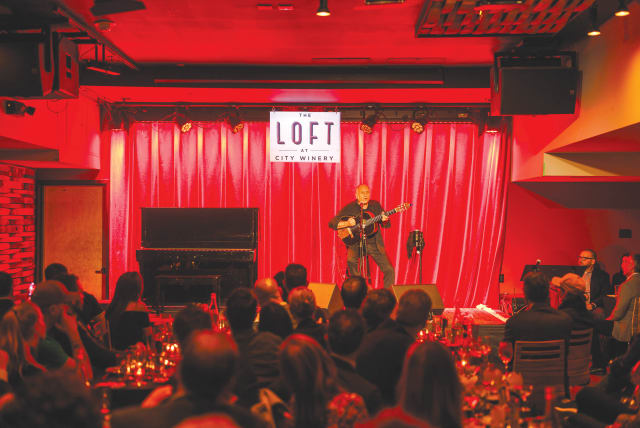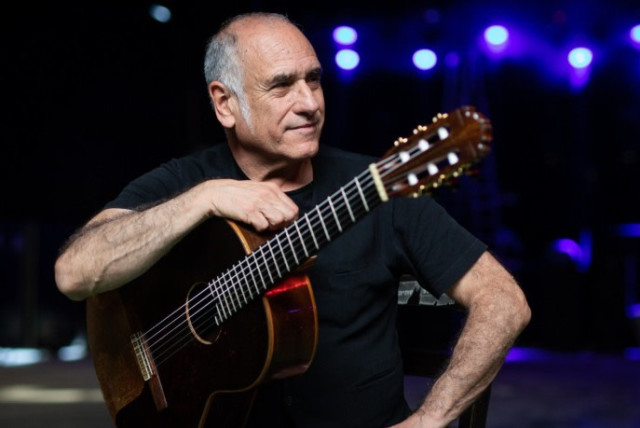Israeli musician David Broza's symphony for disabled inclusivity

Broza performed Monday evening at a benefit at City Winery for Israel ParaSport Center, an organization he has been connected to since age seven.
David Broza has been performing for weeks in Israel and Spain, but he made sure to be back to New York in time to receive an award and play a very special acoustic show for an organization that has been dear to him from the days of his childhood in Tel Aviv.
Broza performed Monday evening at a benefit at City Winery for Israel ParaSport Center, an organization he has been connected to since age seven, when his father, who helped establish the center, regularly brought young David to hang out with Israelis with disabilities.
“I am still in touch with some of them until today,” Broza, 68, tells The Jerusalem Post minutes after landing in the US from Spain, three days ahead of his New York private show.
Thanks to his childhood experiences, the internationally renowned singer-songwriter, who has recorded over 40 albums and is best known for his 1977 song “Yihye Tov,” is as comfortable with people with disabilities as he is writing and performing songs for audiences around the world.
Broza's biography
BROZA WAS born in Haifa and grew up in Tel Aviv and Madrid, while also spending one year in England. His father, Arthur Broza, had a sister in England with cerebral palsy. This inspired his work with Moshe Rashkes, a close friend who was seriously wounded in the War of Independence. Rashkes went on to found and remain active with the center (known until 2021 as Israel Sport Center for the Disabled) for over 50 years, until his death six years ago at age 90.
David Broza reflects on how his father came to be involved with the Israel ParaSport Center in Ramat Gan, where 3,000 people with physical disabilities annually attend and compete in such competitive parasports as basketball, tennis, swimming and archery.
“He thought, if they [his sister and family members] ever came to Israel to live, they should have a club.”
Rashkes’s son, Arik, who with his wife, Orly, served as cochairmen of the New York event, recalls hearing stories of Arthur bringing his sister to the pool and “falling in love with the center.”
Arthur Broza regularly helped in many areas of the center, including fundraising and assisting with the yearly swim across the Sea of Galilee.
For young David, spending days and summers with people with disabilities “seemed natural and was fun.” He notes that “people with disabilities don’t feel sorry for themselves” and that they “fight to be active.”
He recalls pitching in at the club wherever he could be helpful. “I pushed and carried wheelchairs, picked up balls... there is no end to what a sports club needs people to do.”
Broza is proud of what the center offers people with disabilities and notes that “given the right environment, people can become successful.”
He fondly recalls participating in the yearly swim across the Sea of Galilee with participants from the center. “From the time I was seven or eight, I would swim across with them. My father and the executives were in a speedboat. It was a thrill and great fun to swim across with everyone!”
Broza also enjoyed attending summer camp with his sister, Talia, and with participants from the center. He emphasized that while neighborhood children attended camps with nondisabled children, he and Talia spent their summers with children with disabilities. “It was natural. It was a no-brainer!”
While spending so much time with people with disabilities was comfortable and natural for Broza, he notes that “society doesn’t look at it as natural.
“There is a lot of work to be done. The Israeli government needs to continue to work to bring awareness to what they [people with disabilities] need and to treat them as equals.” He emphasizes the need to “bring in funds” and “speak for them” and stresses that he will continue doing his part until he is no longer able to.
Each year, Broza returns to “Spivak” to perform for participants and their families. Many continue to refer to the Israel ParaSport Center as Spivak, a tribute to an early donor after whom a building is named. Broza notes that while the army has its own system of supporting soldiers who become disabled, there will likely be a 30% increase in people coming to the center for services and programs.
LORI KOMISAR, national president of Israel ParaSport Center, strongly believes that “David Broza is part of the center family.” She notes his father’s role as one of the center’s founders, that David has been coming to the center since age seven, and is pleased that he “has continued coming every year since.”
Komisar captures Broza’s active role during his visits. “David sits with the children on opening day, plays guitar, and sings with them. He is a source of inspiration and hope. He would probably say they are his source of inspiration and hope. David opens his heart and devotes his time and energy, and helps build awareness and support for us. But it goes beyond this and beyond the music. It’s all about the love for the children.”
Arik Rashkes, son of the center’s founder and a current board member, recalls also growing up at the center and receiving David Broza music CDs from his father, Arthur. Arik and David are now friends, and Arik stresses what “an integral part of the heart and soul of the center” Broza continues to be.
At the City Winery event, guests learned of the center’s impact from two elite wheelchair tennis players – Amit Vigoda and Ibrahim Baho. Israeli reservist Shalom Zoor, who recently returned to Tel Aviv after serving four months in Gaza, spoke of the important bond between Diaspora and Israeli Jews, and he thanked the audience for its continued support.
Rashkes then presented Broza with a piece of art as the Moshe Rashkes Heroes of Life Recipient. Broza then shared stories and performed a 10-song acoustic set, which included “Ha’isha She’iti,” “Bedouin Love Song,” and “Yihye Tov,” with an additional verse to reflect hope for the future in Israel.
Broza had planned to spend this past fall touring to mark the 40th anniversary of his album Ha’isha She’iti, but canceled the tour when the war broke out.
He has performed more than 200 shows in Israel since the start of the October 7 war. He similarly mobilized to entertain soldiers and others during previous times of difficulty in Israel, including the First Lebanon War (1982).
Jerusalem Post Store
`; document.getElementById("linkPremium").innerHTML = cont; var divWithLink = document.getElementById("premium-link"); if (divWithLink !== null && divWithLink !== 'undefined') { divWithLink.style.border = "solid 1px #cb0f3e"; divWithLink.style.textAlign = "center"; divWithLink.style.marginBottom = "15px"; divWithLink.style.marginTop = "15px"; divWithLink.style.width = "100%"; divWithLink.style.backgroundColor = "#122952"; divWithLink.style.color = "#ffffff"; divWithLink.style.lineHeight = "1.5"; } } (function (v, i) { });

